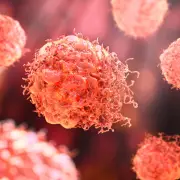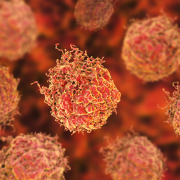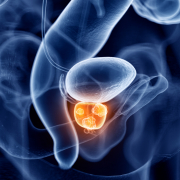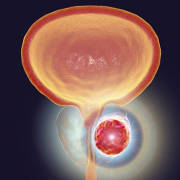What Is Prostate Cancer?
The prostate is a small gland located below the urinary bladder and surrounding the urethra (pelvic cavity). This gland is regulated by the testosterone hormone and produces seminal fluid or semen.
Cancer occurs when abnormal growth occurs in the prostate gland, and in many cases, it usually spreads to the surrounding tissues.
Prostate cancer is one of the most common cancers in men. Statistically, it is known that 1 out of every ten men will be diagnosed with this disease.
In the United States, the diagnosis is usually in the initial stages, but it does not represent all cases, especially in Latin America, whose diagnosis is late. That is, cancer has metastasised to other organs and tissues.
The most affected population is the one between 65 years of age and older (representing 60% of cases), according to epidemiological data from the American Cancer Society (ACS).
What Are the Symptoms of Prostate Cancer?
Table of Contents
The symptoms of prostate cancer are not always perceptible by the subject since many can go years without knowing that they have such a disease. This event occurs commonly in those patients with slow-growing prostate cancer.
In general, the men who develop symptoms are those whose cancer has advanced in extension and/or size. Among these symptoms, we have:
- Urinary problems: the frequent desire to urinate, slow urination stream, blood in the urine (hematuria).
- Sexual issues: sexual dysfunction (impotence), bleeding after ejaculation.
- Pelvic, back, or chest pain due to the spread of cancer to bone tissue, affecting these areas.
- Numbness or loss of sensation in the legs and bladder due to the spread of cancer to the spinal cord.
The first symptoms to appear are urinary. However, some of these symptoms are associated with other pathologies such as benign prostatic hyperplasia and prostatitis.
It is important to note that if some of these symptoms occur – especially hematuria – a specialist doctor should be consulted immediately. Early diagnosis is the key to a speedy recovery.
How Is Prostate Cancer Diagnosed?
Prostate cancer is usually indolent and asymptomatic, and diagnosis is often through health screening.
Digital Rectal Exam
The doctor will insert a gloved finger into your rectum to evaluate the presence of lumps, lumps, or an out-of-normal growth of the prostate.
Prostate-Specific Antigen (PSA) Test
This is a test that detects levels of an enzyme produced by the prostate gland and can be elevated in cases of prostate cancer.
Medical Imaging (e.g. MRI, PET/CT)
Magnetic Resonance Imaging (MRI) can be used to image the prostate gland to determine if there are any usual or suspicious spots in the prostate that might be cancerous.
Positron Emission Tomography (PET) imaging using PSMA ligands can similarly be used to image the patient with suspected prostate cancer, evaluate the prostate, and determine if there is any spread of disease.
The ultimate diagnosis of prostate cancer will depend on a tissue sample. This requires a prostate gland biopsy to extract small tissue samples for testing.
What Are Some of the Treatment Options & Side Effects of Prostate Cancer?
Your doctor will recommend the best therapeutic options, according to your age and stage of the disease. In some cases, it begins with active surveillance in the absence of symptoms.
In case of preexisting symptoms, the therapeutic alternatives for the treatment of prostate cancer are the following:
1. RADIATION
External Beam Radiation therapy is one of the options used to treat prostate cancer. This is typically done when the cancer is confined to the prostate, with low probability or no evidence of spread.
Each radiotherapy session lasts from 10-30 minutes on average, and its frequency is approximately five a week for ten weeks. This may vary depending on the size of the cancer and the specialist’s criteria.
2. CHEMOTHERAPY
Chemotherapy is typically used when prostate cancer has spread and primarily for disease control. This can be combined with other forms of treatments (e.g. radiation or hormonal).
3. TARGETED THERAPY
Targeted therapy typically targets specific pathways in the tumour replication cycle.
Among the most widely used drugs we have rucaparib (rubraca) and olaparib (Lynparza), which treat metastatic castration-resistant prostate cancer.
4. IMMUNOTHERAPY
Immunotherapy is nothing more than a treatment that stimulates the immune system of men with prostate cancer to attack cancer cells. The vaccine is called Sipuleucel-T (Provenge).
This vaccine treats patients with advanced cancer who do not respond to hormone therapy and have little or few symptoms. It is created specifically for each man from his white blood cells in combination with proteins.
The vaccine does not cure cancer, but it does increase survival rates. Once again, it will be the doctor, the one person who determines if you are a suitable candidate for this treatment.
5. SURGERY
Prostatectomy is often the mainstay for treatment in patients with early-stage prostate cancer. This involves removing the prostate gland with possible dissection of the regional pelvic lymph nodes.
General or regional (spinal) anaesthesia is usually used, numbing the lower body.
Patients often choose laparoscopic surgery or robot-assisted prostatectomy since recovery is faster and has fewer side effects. Other types of surgery are laser and endoscopic, and – in both – a probe is inserted through the opening of the penis.
Transurethral Resection of the Prostate and Transurethral Incision of the Prostate (TUIP) is another procedure to cut enlarged prostate segments, which are removed through the bladder.
6. THERANOSTICS
Concerning theranostics as a form of treatment, we will mention two options aimed at prostate cancer:
- Radium-223 (Xofigo) Therapy: This drug works like targeted radiation therapy, used when cancer has spread to the bone and helps prevent symptoms of the disease.
- Prostate-Specific Membrane Antigen (PSMA) Therapy with Lutetium-177: Like all theranostics therapies, it is a nuclear medicine radionuclide treatment. This allows for very specific, targeted radiation therapy.
Coping With Prostate Cancer & Seeking Support
Every cancer treatment can cause side effects or result in changes to your body and how you feel. The side effects experienced vary between individuals. As such, it can be hard to predict and anticipate what you may feel during cancer treatment.
As you prepare to start cancer treatment, it is normal to feel anxious and concerned about the treatment-related side effects. Speak to your medical care team about your worries. It may help to know that they are prepared to help you cope with these side effects.
Coping With the Physical Side Effects of Prostate Cancer
Talk with your health care team regularly about how you are feeling. It is important to let them know about any new side effects or changes in existing side effects. If they know how you are feeling, they can find ways to relieve or manage your side effects to help you feel more comfortable and potentially keep any side effects from worsening.
You may find it helpful to keep track of your side effects, so it is easier to explain any changes with your health care team.
Some physical side effects can continue even after treatment ends. This is referred to as long-term side effects, and they can occur months or years after treatment. Treating these long-term side effects is an important part of survivorship care.
Coping With the Sexual Side Effects of Prostate Cancer
Unfortunately, the treatment for prostate cancer can affect one’s sexual health. While some of these sexual side effects may be temporary and go away within a year after treatment, some can be longer-lasting.
Talk with your medical care team about how your treatment can affect your sexual health. Here are some side effects that you can expect from prostate cancer treatment:
- Reduced or a loss of sexual desire. Some treatments for prostate cancer can lower testosterone levels and affect your sexual desire, making you less interested in physical intimacy or intercourse.
- Erectile dysfunction
- Treatment may cause patients to experience a reduction in semen production. This can affect one’s chances of fathering a child.
- Some patients may find that their penis shrinks after prostatectomy by up to an inch. Research has indicated that this side effect is temporary, and the penis regains its size after a year.
If you experience any of these side effects, speak with your health care team about how you can manage or cope with the sexual side effects of prostate cancer. While this may be uncomfortable for some, sexual recovery is an integral part of the quality of life, and your health care team will be able to help you.
Additionally, patients may find that it takes longer to become aroused as they may feel distracted or anxious. Patients often find it challenging to address the sexual side effects of prostate cancer with their partners. However, it can be helpful to focus on other forms of intimacy, such as kissing and cuddling. This can aid in keeping the connection between you and your partner strong.
Coping With the Emotional & Social Side Effects of Prostate Cancer
It is normal for you to experience emotional and social effects after a prostate cancer diagnosis. This may include dealing with challenging emotions, such as sadness, anxiety, anger. It is essential for you to manage your stress level during this period.
If you find it challenging to speak to your family or loved ones about the feelings you are experiencing during this time, you may want to speak to a counsellor or seek support within your faith.
Coping With the Costs of Prostate Cancer Treatment
Prostate cancer treatment can be expensive. It is often a significant source of stress and anxiety for patients with cancer. In addition to prostate cancer treatment costs, many patients find they have extra, unplanned expenses related to their care. The high cost of medical care stops some people from following or completing their cancer treatment plan.
However, your health is a priority. Therefore, patients and their families are encouraged to talk about financial concerns with a member of their health care team.
What Are Some Recommended Changes to My Diet if I Have Prostate Cancer?
While there is no evidence that any particular foods have an effect on prostate cancer, it is important to adopt a healthy diet to keep your body nourished.
Treatment for prostate cancer can cause issues with your diet, such as diarrhoea after undergoing radiotherapy. Some men find it challenging to maintain a healthy weight. They may find themselves either under or overweight. Speak to our doctor about being referred to a dietitian if you find it difficult to keep within a healthy weight range.
What Is a Healthy Diet for Prostate Cancer?
A healthy diet if you have been diagnosed with prostate cancer is about balancing the different food groups and choosing foods that are both tasty and nutritious.
- Aim for at least 5 portions of fruit and vegetables each day. This can be fresh, tinned, frozen or dried.
- Aim for a range of different colours of fruit and vegetables. This gives you a variety of essential vitamins and minerals.
- Include starchy foods daily, such as potatoes, bread, rice and pasta.
- Opt for whole-grain versions of cereals, bread and pasta.
- Remember to include pulses such as beans, lentils and peas; they are a low-fat alternative to meat and a healthy source of protein.
- Avoid processed meats such as ham, bacon, and sausages.
- Limit the amount of red and processed meat.
- Choose lean meat, chicken, or fish instead.
- Limit saturated fats found in fatty meat, biscuits, crisps, cheese, cream and butter.
- Use healthier unsaturated fats like vegetables, olive and sunflower oils.
- Limit the amount of high-calorie in your diet.
Additionally, ensure you are getting enough water each day. Aim for 6 to 8 glasses daily. A well-balanced diet can help keep your body strong and aid you in recovering from prostate cancer.
Bowel Problems With Prostate Cancer – When to Seek Help
Radiotherapy to the prostate gland can alter the way your bowel functions. You may find that your bowel movements are more frequent and loose. Changing your diet can help tackle this issue.
Additionally, radiotherapy to the prostate gland can affect tissue and the surrounding organs in one’s pelvic area, leading to more long term side effects. Speak to your doctor if you find yourself:
- Needing to poo at night
- Rushing to the loo to have a bowel movement or not being able to make it in time
- Bleeding from your rectum
If you experience other bowel symptoms that interfere with you living an active full life and find it challenging to stick to a healthy diet due to these side effects, speak to your doctor or dietitian about the steps you can take to cope.
Where Can I Find Support in Singapore if I Have Prostate Cancer?
If you have been diagnosed with prostate and are looking for support groups in Singapore, here are two options that you may want to consider:
- http://www.urologycentre.com.sg/prostate_cancer_support_group.html
- https://www.singaporecancersociety.org.sg/get-help/cancer-survivor/join-a-support-group/walnut-warriors-support-group.html
How Can I Help Support a Loved One With Prostate Cancer?
If you are the primary caregiver for someone who has been diagnosed with prostate cancer, you may be wondering how you can better care for your loved one.
Understanding the Caregiver Role
As a caregiver, you provide support in various forms. This may include day-to-day activities, medical needs, helping them make important decisions, and tending to their emotional needs.
The role of a caregiver takes many forms. Understanding what is required of you can better prepare you to carry out your responsibilities in helping your loved one. The extent of help that your loved one needs may vary depending on their stage of diagnosis, age, and overall health.
There are 5 broad categories of what is needed from a caregiver. They are:
- Physical needs, which includes aiding with daily activities.
- Health and medical needs; where you ensure that the patient is taking medicine and attending their medical appointments.
- Emotional needs; in which you show your love and support.
- Spiritual needs; where you are there to help them continue their religious practices and beliefs.
- Financial and legal needs; where you aid them in managing their insurance and assets when they cannot do so and planning for their future.
Caregiving Is a Team Effort
It is important to talk to your loved ones and include them in the planning and decision-making process if the patient is comfortable with this. It helps to be able to share the load amongst different caregivers.
For instance, one family member or friend could be handling financial affairs and another providing daily care. Sharing the load can make it easier for you to take care of your loved one.
Caregiver Support
Taking on the role of a caregiver can come with its own set of stresses and uncertainties. It is important to recognise your own needs and capabilities. This will help you avoid caregiver burnout. Remember, you cannot care for your loved one if you are unwell or burnt out.









